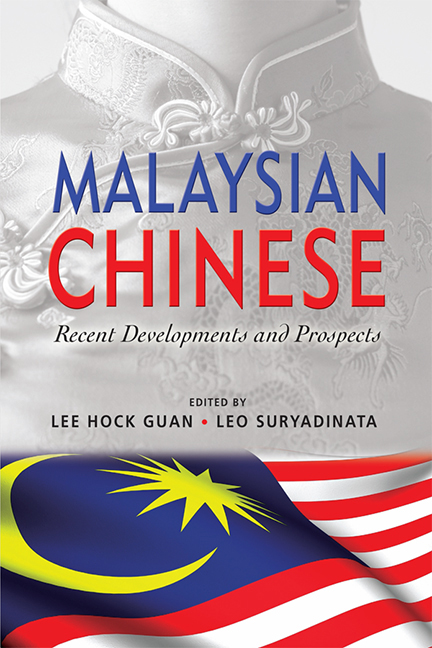Book contents
- Frontmatter
- Contents
- Preface
- Contributors
- Glossary
- Introduction
- 1 Malaysia: Ethnicity, Nationalism, and Nation Building
- 2 Being Muslim and Chinese in Malaysia
- 3 Quo Vadis: The Chinese in Malaysia
- 4 At a Crossroads: Malaysia's Coalition Politics and Chinese-based Political Parties
- 5 The End of Chinese Malaysians’ Political Division? The March 8 Political Tsunami and Chinese Politics in Penang, Selangor, and Perak
- 6 Forced to the Periphery: Recent Chinese Politics in East Malaysia
- 7 The New Malaysian Economic Agenda: Some Preliminary Observations
- 8 The Old And New Malaysian Chinese Language Press, with Special Reference to the 12th General Election
- 9 Education of the Chinese in Malaysia
- Index
4 - At a Crossroads: Malaysia's Coalition Politics and Chinese-based Political Parties
Published online by Cambridge University Press: 21 October 2015
- Frontmatter
- Contents
- Preface
- Contributors
- Glossary
- Introduction
- 1 Malaysia: Ethnicity, Nationalism, and Nation Building
- 2 Being Muslim and Chinese in Malaysia
- 3 Quo Vadis: The Chinese in Malaysia
- 4 At a Crossroads: Malaysia's Coalition Politics and Chinese-based Political Parties
- 5 The End of Chinese Malaysians’ Political Division? The March 8 Political Tsunami and Chinese Politics in Penang, Selangor, and Perak
- 6 Forced to the Periphery: Recent Chinese Politics in East Malaysia
- 7 The New Malaysian Economic Agenda: Some Preliminary Observations
- 8 The Old And New Malaysian Chinese Language Press, with Special Reference to the 12th General Election
- 9 Education of the Chinese in Malaysia
- Index
Summary
The 8 March 2008 Malaysian general election stunned the incumbent Barisan Nasional (BN) coalition for it was bereft of the two-third parliamentary majority the coalition traditionally has held since the country obtained political independence in 1957. The electoral outcome was considered a tremendous shock to the BN and Prime Minister Abdullah Badawi. Not only did the BN see its share of the popular vote fall to 50.6 per cent, it now also lacked the necessary two-third majority to amend the Malaysian Constitution in Parliament. Indeed, compared with the 2004 general election when the newly appointed Prime Minister Badawi led the BN to its biggest electoral win, the results of the 2008 were shocking.
Do the results of the 2008 general election signify the transformation, albeit transitional, of Malaysia into a two-coalition party system — hence a more “democratic” — wherein the power of the people is truly exercised? Or do the election results simply indicate that things are out of balance? In the Malay dominated politics of Malaysia, what could have caused the sudden shift away from the BN to the opposition, which is composed of the ethnically Chinese-dominated DAP, the multi-ethnic Parti Keadilan Rakyat (PKR), and the religiously inspired PAS? What are the implications for the Malaysian Chinese, who voted overwhelmingly for the opposition? Can the Chinese-based parties, the MCA and the Gerakan, survive into the future?
ELECTION OUTCOME:
2004 VS. 2008
The 2008 election results were all the more startling when compared with the overwhelming and decisively strong BN electoral victory in 2004. A comparison of the breakdown of parliamentary and state seats in 2008 and 2004 (see Table 4.1) will clearly show that all the parties in the BN coalition, even UMNO, lost a sizeable number of parliamentary and state seats in the 2008 vis-à-vis their overwhelming electoral victory in 2004. Although analysts and the Internet political pundits have postulated that the BN would return to power, they were also unanimous in their predictions that the BN votes for the 2008 election would be severely reduced owing to its alienation of the Chinese and Indian voters. This prediction is largely correct as demonstrated by comparing the 2004 and 2008 election results.
- Type
- Chapter
- Information
- Malaysian ChineseRecent Developments and Prospects, pp. 70 - 85Publisher: ISEAS–Yusof Ishak InstitutePrint publication year: 2011

